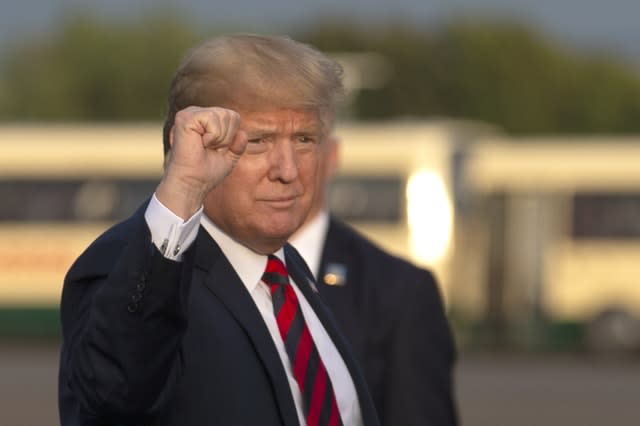Trump’s foreign policy decisions putting strain on UK-US relations, peers say
The UK’s relationship with the USA is under “disturbing pressure”, and if Donald Trump secured a second term in the White House it would result in “longer lasting” damage to the alliance, peers warned.
The Lords International Relations Committee said the actions of the Trump administration over issues including the Paris climate change deal, the Iran nuclear accord and steel tariffs had been “contrary to the interests of the UK”.
After an inquiry which took evidence from senior politicians and foreign policy experts on both sides of the Atlantic, the peers said the UK may have to place “less reliance” on reaching a common position on foreign policy with Washington than it had in the past.
In a wide-ranging report examining the shifting state of global affairs, the committee recommended:
– Seeking to work closely with China on addressing global challenges while ensuring co-operation is consistent with humanitarian law
– Continuing to counter and deter the activities of “declining power” Russia, but remain open to dialogue with Moscow on issues including counter-terrorism and nuclear non-proliferation
– Appointing a minister with specific responsibility for cyber security and establishing an international “coalition of the willing” to tackle the increasingly significant online threat.

With the next US presidential election in 2020, the committee said another Trump victory – or the election of another similar administration – could further weaken the transatlantic alliance.
The report noted that while intelligence and defence co-operation with the US continued, “the difficulty the UK and its allies have faced in trying to influence the US demonstrates the challenge of working with the administration”.
“How damaging this will be to what has hitherto been the UK’s most important international relationship will depend on whether the current approach is an enduring trend.
“Should President Trump win a second term, or a similar administration succeed him, the damage to UK–US relations will be longer lasting; and the Government will need to place less reliance on reaching a common US/UK approach to the main issues of the day than has often been the case in the past.”
The peers noted that some of the decisions taken in Washington do not stem solely from Mr Trump’s “America First” agenda, but form part of a broader shift towards a more inward-looking US.
On China, the committee acknowledged concerns over its human rights record and behaviour in cyberspace, but said the UK should continue to work closely with Beijing on international issues.
“In the longer term, the Government will need to weigh up the strategic challenges posed by China’s approach to its international role, and its impact on the rules-based international order, against China’s growing economic significance.”
Turning to Russia, the peers said “the UK should continue to work closely with its allies to counter Russian disinformation campaigns and deter its hybrid warfare tactics”.
The report added: “In the context of a strained transatlantic relationship, an increasingly assertive China, a disruptive Russia and broad shifts to the global balance of power, it remains firmly in the UK’s national interest to maintain the strongest possible partnership on foreign and security policy with its like-minded European partners, both bilaterally and at an EU level, after Brexit.”
Tory former Cabinet minister Lord Howell of Guildford, the committee’s chairman, said: “International affairs are in a state of upheaval, and the re-shaping and conduct of British foreign policy must respond.
“After a year of taking evidence from our expert witnesses we conclude that, while welcoming existing efforts to adapt, a new strategic approach and vision are both needed, led from the centre of government. “

 Yahoo News
Yahoo News 